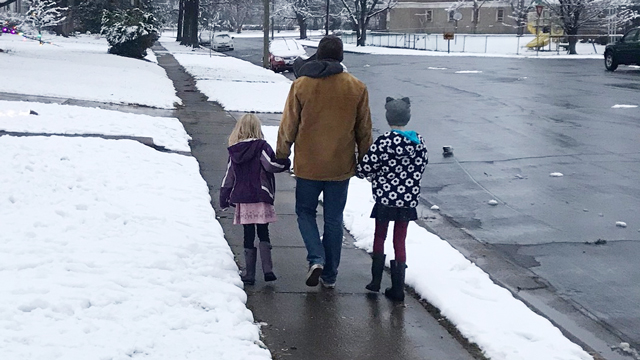Recently, a good friend of mine from the Midwest started giving serious thought to moving to Richmond with his family. We were chatting about different RVA neighborhoods when I thought it’d be easier to mark up a map on my iPad of places for him to look. I started circling areas with my stylus. Only when I paused to hit send did I realize that I had basically recreated the Home Owners’ Loan Corporation redlining map from the 1930s, a government-sponsored program that made it close to impossible to get mortgages in black neighborhoods.
I try to talk about my personal experiences with my daughters, especially when I’ve made mistakes, so I shared this story with my family at our dinner table that evening as an example of how Richmond is still a very segregated city. This initially confused my 12-year-old. She had learned how segregation was made illegal after hard-won victories from the Civil Rights Movement in the sixties. We had just visited Determined, the groundbreaking exhibit at the Virginia Museum of History and Culture. How could segregation still be a thing if it was against the law?
My wife and I explained redlining and generational wealth and how the laws changing doesn’t mean that people change. We talked about where we live and how even though Richmond is 50 percent black, our neighborhood isn’t. Is it because we’re racist and didn’t want to live near black people? No. Is it because of a long history of racial discrimination that we have and continue to benefit from as a white family? Absolutely.
My little nuclear family consists of my wife Kat, my two daughters, ages nine and twelve, and me. Our particular genomes result in a level of melanin in our skin that absorbs vitamin D at the expense of UV protection. Our skin is relatively light in color. We’re also white.
We’re white because we’re told we’re white; we’re white because people think we’re white; and we’re white because we believe we’re white. We’re white in a racist society where our whiteness affords privilege upon privilege. If we aren’t deliberate, we could go through our lives blind to the everyday injustices that families who look like us have benefitted from for centuries.
Everyone has unconscious biases. It’s part of being human. Growing up in a world where people have historically been and continue to be marginalized based on their skin color leads to unconscious racial biases. My unconscious racial biases aren’t my fault, but it’s my responsibility to uncover them, make them conscious, and work to improve myself. As a parent, I also consider it my responsibility to help my daughters identify their own biases. A great start is making sure that we regularly talk with them about race.
A lesson we’ve tried to teach our kids is that even if no one is doing it intentionally, racial bias seeps into and informs our actions every day. My daughters attend Richmond Public Schools that demographically look like Richmond City does. My kids do the things all kids do: They learn, they play, they hang out, they gossip, and occasionally, they have conflicts with other kids. They do these things with white students and students of color alike.
When these conflicts do occur, I ask my daughters to be aware of how race can change how things are perceived. For example, a white girl telling on a black boy has a dramatically different context in our society than a white girl telling on another white student. It’s not at all fair, but generally, a white girl is more likely to be believed than a black boy, who is also more likely to receive harsher consequences than if the situation were reversed.
I can’t expect my daughters to solve the problem of unconscious racial bias themselves, but I can teach them to be aware they have this unearned power and they should be mindful when using it. Their actions have a wind at their back with a strength they might not realize. I absolutely want my daughters to stand up for themselves and ask for adult intervention if they feel threatened by anyone, but also to really think about their own motivations and reasons before escalating in a way that could result in a disproportionate response.
I’m grateful that my family lives in a city that demands daily interaction across racial lines. It makes us better humans. If we lived in a less diverse place, we would confront our own biases less. Unchallenged, we’d assume that our experiences were universal when that’s anything but the case.
Richmond challenges us to be better. I don’t send my kids to Richmond Public Schools because I think having more white students will fix the district’s problems. I feel fortunate that I get to send my kids to school in such a diverse district because it will help make them better people. My daughters will grow into better adults because of this city and the interactions they have every day with their fellow humans, many of whom look different than they do.
I’m not perfect, and talking and writing about race is hard. I strive to continuously learn, listen more than I speak, and always try to improve. Modeling this for my kids is an important first step. And, I expect it won’t be long before my daughters are the ones teaching me about biases I didn’t know I had and would never have found on my own.
________________________________________________
Watch This With Your Kids and Begin Your Journey to Understanding
This 17-minute installment from Phil Vischer at HolyPost.com is perfect for families with kids ages ten and up. Slavery ended in America with the stroke of a pen in 1865, but the 13th Amendment didn’t end institutional racism. From Reconstruction to Black Lives Matter, this is an important historical examination of the last 125 years of life in America. Phil Vischer is asking white families to care, listen, and learn.




